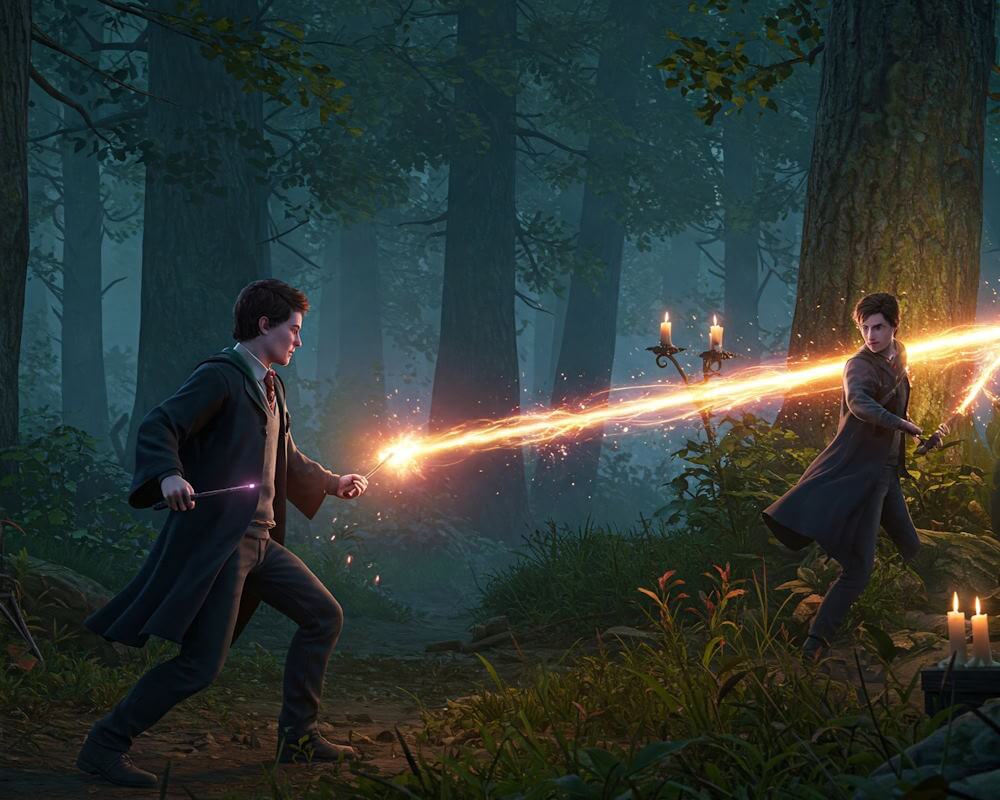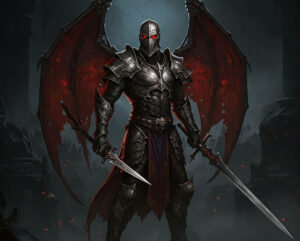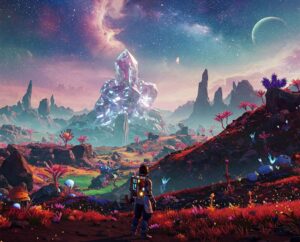Hogwarts Legacy stands as a remarkable addition to the expansive Harry Potter universe, embodying a role-playing game (RPG) experience that invites players to explore the iconic wizarding world. Set in the 1800s, long before the events of J.K. Rowling’s original series, the game immerses players in a rich narrative, allowing them to uncover intriguing stories and secrets hidden within the hallowed halls of Hogwarts School of Witchcraft and Wizardry.
Upon entering this captivating realm, players are given the unique opportunity to craft their own wizard or witch, personalizing skills, appearance, and magical abilities. This character creation mechanism significantly enhances immersion, as players forge their own destinies amidst ancient magic and potent spells. The degree of customization afforded to players not only enriches gameplay but also fosters a deeper connection to the overarching narrative, making each journey through Hogwarts a unique experience.
Hogwarts Legacy embraces the quintessential elements of RPGs, offering expansive areas for exploration beyond the school grounds, including enchanting landscapes and hidden chambers that create a sense of wonder and discovery. As players navigate through various quests, they encounter a variety of characters, both familiar and original, enhancing the overall storytelling this game strives to achieve. Furthermore, the players’ actions and choices can influence the broader world, adding layers of complexity to the gameplay and narrative.
With its blend of nostalgia and innovative mechanics, Hogwarts Legacy has generated considerable excitement among fans and newcomers alike. This anticipation points to the game’s potential to not just entertain but also to become a defining title within the Harry Potter franchise. The upcoming sections will delve deeper into the game’s mechanics, narrative depth, and overall reception, providing insights into whether the title lives up to its hype.
The Allure of Chaos in Gameplay
‘Hogwarts Legacy’ invites players into a world where chaos reigns supreme, particularly through its engaging spellcasting mechanics, dynamic combat system, and a richly interactive environment. The game’s foundation is deeply rooted in the magical lore of the Harry Potter universe, empowering players to harness a broad array of spells that can be unleashed with unpredictability and flair. For example, players can deftly combine offensive spells, such as Incendio and Expelliarmus, to create surprising yet effective combinations that can disrupt enemies in combat. This embracing of chaos not only makes battles more engaging but also opens the door to experimentation with various spell interactions, fostering a sense of creativity and individuality in gameplay.
Another aspect contributing to the allure of chaos is the game’s responsive environment. Players are encouraged to interact with their surroundings, whether it involves using spells to manipulate objects or trigger environmental hazards against adversaries. An example can be drawn from encounters in the Forbidden Forest, where players can summon vines or topple tree branches to create unanticipated strategic advantages. This unpredictability can lead to chaotic scenarios, as players find themselves navigating not only the enemy’s responses but also the repercussions of their own spellcasting decisions.
The game’s chaos can enhance the gaming experience, providing moments of excitement and tension. However, it can also lead to instances of confusion, particularly in crowded combat situations where multiple spells and effects are in play. Despite this potential for disruption, the overall design of ‘Hogwarts Legacy’ manages to maintain a delicate balance, ensuring that players are regularly reminded of the thrill that comes from chaos. In this way, ‘Hogwarts Legacy’ successfully cultivates a gameplay environment where unpredictability and spontaneity are celebrated, ultimately enriching the player’s journey through the wizarding world.
Character Development and Customization
In the expansive world of Hogwarts Legacy, character development and customization play pivotal roles in shaping the player experience. Players can forge their unique identities by choosing their respective houses—Gryffindor, Slytherin, Hufflepuff, or Ravenclaw—each of which comes with distinct traits and influences the story narrative. This choice not only impacts house-specific interactions but also underscores the chaotic nature of the game. By aligning with a particular house, players can engage deeply with the lore of the Hogwarts universe, enhancing immersion within this beloved franchise.
Furthermore, the game’s customization options extend beyond house selection. Players are afforded the opportunity to tailor their character’s appearance, allowing for a highly personalized experience reflective of individual preferences. Customization encompasses a variety of visual elements, including hair styles, facial features, and clothing, contributing to a sense of ownership over one’s journey in the game.
In addition to aesthetic choices, Hogwarts Legacy introduces a robust system for developing magical abilities and skills. Players can select spells and talents that align with their preferred gameplay style, whether that is focusing on stealth, brute strength, or clever manipulation of magical elements. Early gameplay feedback suggests that this flexibility in skill development significantly enhances engagement, as players often feel a stronger connection to their character, making chaotic encounters much more thrilling and rewarding.
Moreover, the interplay between character customization and the chaotic events within the game fosters a personalized adventure that resonates with each unique player. Whether navigating through heated duels or unraveling mysterious quests, the depth of customization available in Hogwarts Legacy ensures that every player’s experience feels distinct, compelling, and intimately tied to the core aspects of the narrative.
Storyline and Narrative Depth
The narrative structure of Hogwarts Legacy intricately blends the legacy of the Wizarding World with new, innovative storytelling elements that offer players a unique experience. Set in the 1800s, before the events of the Harry Potter series, the game immerses players in a rich backdrop filled with familiar locations, magical creatures, and a sense of nostalgia that appeals to long-time fans. The central storyline revolves around a protagonist who discovers their extraordinary ability to harness and manipulate magic. This ability positions the character at the heart of a brewing conflict involving powerful dark forces, thereby establishing a premise loaded with potential for chaos.
A significant facet of the game’s narrative is the emphasis on player choice. Players are not merely passive observers but active participants in shaping the unfolding story. Throughout the gameplay, critical decisions can influence the protagonist’s moral alignment and the overall outcome of events. The themes of choice, morality, and consequence are interwoven into the fabric of the narrative, encouraging players to reflect on their actions and the dire repercussions they may entail. This dynamic approach to storytelling enhances player engagement and augments the overall depth of the narrative.
In terms of chaos, the narrative artfully illustrates how players can either embrace or resist the darker elements of magic. Engaging with various factions and encountering moral dilemmas enriches the plot, presenting players with paths that lead to diverse endings. This breadth of choice serves to exemplify the chaos that can ensue when wielding immense power, allowing for a deeply personal narrative experience. Ultimately, the storyline of Hogwarts Legacy not only captures the essence of the Wizarding World but also challenges players to navigate their moral compass amidst the turmoil. This delicate balance between chaos and choice is what elevates the game’s narrative depth and aligns with player expectations on a profound level.
Graphics, Sound, and Immersion
In the realm of video games, the quality of graphics and sound plays a pivotal role in shaping the overall player experience. In ‘Hogwarts Legacy’, the graphical fidelity is impressive, presenting players with a vibrant rendition of the iconic Hogwarts School of Witchcraft and Wizardry. Leveraging cutting-edge technology, the game creators have cultivated an authentic atmosphere that reflects the whimsical yet chaotic world of magic. The intricate details of the castle’s architecture, lush landscapes, and animated magical effects contribute significantly to the immersion that fans of the Harry Potter franchise have long anticipated.
The design of the environments within ‘Hogwarts Legacy’ is nothing short of captivating. Players can explore a meticulously crafted world that oscillates between serene and chaotic, echoing the unpredictable nature of magic itself. Environments such as the Forbidden Forest and Hogsmeade are not merely backdrops; they pulsate with life, accentuated by dynamic weather systems and time-of-day changes, enhancing the sense of immersion. This meticulous attention to detail results in a gaming experience that feels alive and reactive, reinforcing the game’s chaotic undertones as players navigate through it.
Furthermore, sound design significantly enriches the immersive experience. The auditory landscape of ‘Hogwarts Legacy’ features a diverse range of sounds that enhance both the magical and chaotic elements of gameplay. Ambient sounds, such as the rustling of leaves or distant magical bursts, immerse players deeper into the wizarding world. The score, composed to evoke emotion as well as tension, complements the visual elements perfectly, intensifying the atmosphere and making the chaos more palpable. Together, these components not only fulfill but in many ways exceed the expectations set by modern gaming standards, creating an engaging and dynamic world to explore.
Community Reactions and Critiques
The release of ‘Hogwarts Legacy’ has generated a significant buzz within the gaming community, capturing both admiration and scrutiny. Players have taken to various platforms, including forums, social media, and reviews, to express their views on the game’s chaotic elements and overall execution. Many gamers praised the immersive experience that ‘Hogwarts Legacy’ provides, highlighting the detailed recreation of the iconic settings and rich narratives derived from the wizarding world. Enthusiasts noted that the ability to wield magic, explore expansive environments, and engage in dynamic interactions adds depth to the gameplay.
However, not all feedback has been positive. A segment of the community has critiqued the implementation of chaos within the game, questioning whether it enhances or detracts from the core experience. Some players reported that certain chaotic mechanics felt unrefined or forced, leading to moments of frustration during gameplay. This group expressed concerns over whether the chaotic elements were truly aligned with the thematic expectations set by the Harry Potter franchise. Issues related to game balance and mechanics were frequently mentioned, as well as the perceived lack of polish in some areas that contributed to the chaotic atmosphere.
Moreover, social media discussions reflected a diverse array of opinions, with players sharing both exhilarating experiences and bewildering moments within the game. Content creators on platforms such as Twitch and YouTube showcased their gameplay, often highlighting both the chaotic elements that captivated them and the shortcomings that resulted in confusion or dissatisfaction. As the discourse continues, it becomes evident that while many fans are eager to embrace the chaos associated with ‘Hogwarts Legacy’, others remain cautious, urging for improvements and refinements. This mixture of perspectives provides valuable insight into the game’s impact and its reception within the broader gaming landscape.
Comparisons with Other RPGs
When evaluating “Hogwarts Legacy” within the expansive role-playing game (RPG) landscape, it is essential to draw comparisons with several hallmark titles in the genre. Games like “The Witcher 3: Wild Hunt,” “Elden Ring,” and “Skyrim” have garnered praise for their intricate world-building, storylines, and chaotic gameplay elements, serving as benchmarks for assessing “Hogwarts Legacy.”
In contrast, “Elden Ring” introduces chaos through its fast-paced combat and challenging mechanics. The game offers a plethora of worlds to explore that are imbued with lore and narrative depth. However, the chaos in “Elden Ring” is often player-driven, shaped by exploration and the vital need for survival against overwhelming odds. This contrasts with the more structured chaos found in “Hogwarts Legacy,” which allows players to engage with familiar characters and environments in a historically rich setting.
Moreover, “Skyrim” sets itself apart with its open-world design, enabling players to create their own chaos through quests, character development, and exploration. The game emphasizes player autonomy and offers countless possibilities for deviation from linear narratives, a feature that aligns with the open-ended nature of “Hogwarts Legacy.” While “Hogwarts Legacy” offers a distinct narrative rooted in the Wizarding World, its RPG mechanics share fundamental traits with these popular games, ultimately establishing a unique position in the genre that resonates with fans of classic RPG adventures.
Future Updates and DLC Potential
The gaming community has many expectations regarding future updates and downloadable content (DLC) for ‘Hogwarts Legacy’. As an open-world role-playing game set in the rich universe of Harry Potter, the game already captivates players with its compelling narrative and immersive gameplay. However, there are numerous opportunities for developers to enhance the chaotic experience further through timely updates and additional content.
Firstly, player feedback is invaluable in shaping the future of ‘Hogwarts Legacy’. The developers have shown a willingness to engage with the community, often taking suggestions into consideration. Players have expressed interest in new storylines, character arcs, and engaging missions that might introduce fresh elements into the existing framework. Expanding the game world with new areas to explore or returning characters from the Harry Potter series could be significant drivers for future DLC.
Moreover, introducing new spells, combinations, and potion recipes could enrich the gameplay experience. These additions would not only enhance character development but also deepen combat mechanics, allowing for more chaotic and dynamic duels. Given the appeal of customization in many RPGs, players may welcome the chance to tailor their character’s abilities or even their magical aesthetics through future content.
Additionally, seasonal events and themed challenges could provide ongoing engagement beyond initial gameplay. These updates can foster a sense of community and excitement around competition among players while deepening their connection to the narrative elements inherent in ‘Hogwarts Legacy’. As the game evolves, it remains to be seen how developers respond to the community’s aspirations, with the promise of new adventures that bring an additional layer of chaos to the already vibrant world.
Conclusion: Is the Hype Justified?
As we draw together the various threads of discussion surrounding “Hogwarts Legacy,” it is evident that the game has sparked considerable excitement among players and critics alike. The unique blend of chaotic gameplay, spellcasting mechanics, and a richly designed world offers a compelling experience that draws primarily from the beloved Harry Potter franchise. As a result, it stands to reason that the hype surrounding “Hogwarts Legacy” is rooted in a desire to explore elements of unpredictability within a familiar setting.
Examining the gameplay dynamics, players are introduced to a variety of magical encounters that challenge skills and tactics. The chaotic nature of the interactions, from combating magical creatures to engaging in spell duels, offers players an engaging form of entertainment. This satisfies those who appreciate a game that does not merely follow a linear narrative but rather encourages exploration and experimentation. Additionally, the depth of customization and potential for character progression further enhance the excitement factor, ensuring players remain invested over time.
Furthermore, “Hogwarts Legacy” does not just contribute to the immediate gaming market; it also holds potential longevity, supported by a community eager for further content. Players often seek games that invite continuous engagement, and the elements of chaos within “Hogwarts Legacy” lend themselves well to this end. While the game’s design and mechanics may not be universally appealing, for those who relish moments of disorder within a crafted experience, it undoubtedly lives up to the anticipation it has garnered.
In summary, the combination of immersive storytelling, spellcasting chaos, and exploration culminates in a product that both honors its legacy and invites new players into the fold. As such, the hype surrounding “Hogwarts Legacy” appears to be justified, positioning it as a noteworthy entry in today’s gaming landscape.





